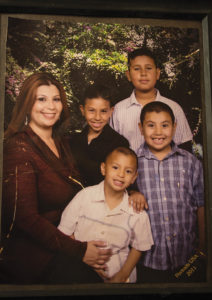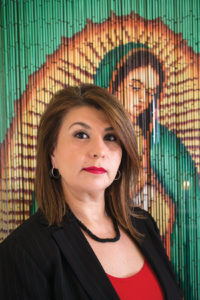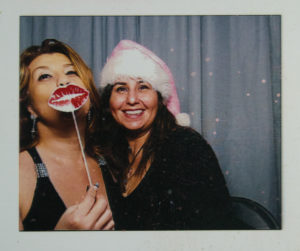Maria Lourdes “Lulu” Vallejo sat on a couch in her sister’s Grand Prairie home not far off Interstate 20, her lap full of documents that could easily be filed under the label “Depressing.” The paperwork detailed her need for various types of public assistance. Housing. Food. Utilities. Holiday meals and Christmas gifts for her four sons.
“Nobody in my family is on government programs but me,” Lulu said, as tears fell down her cheeks. “I’m such a fuck-up. I’m such a fuck-up.”
An argument could be made that there’s truth in that statement. Gang members, even former ones, aren’t exactly considered exemplary citizens. And then there are Lulu’s four divorces. One of her exes was stripped of his nationality for, as Lulu put it, “doing something stupid,” and another is in prison serving a life sentence for shooting and killing his brother. The father of two of Lulu’s sons lives in California but is unable to provide much financial help because he can barely support even himself.
Lulu’s poor choices in mates left her with four bottomless pits to feed on her own. They go through seven gallons of milk per week. All four boys are living under her roof, though one is now an adult. He’s 20 and works for FedEx, but the job is part-time. He helps his mom as much as he can. The other boys are 13, 16, and 17.

Supporting the family became a lot harder for Lulu last June when she was fired from her full-time job. Seems the corporate world frowns upon employees who throw things and call their bosses Nazis. Since then, she and her sons have been sustained through public assistance programs and her ever-supportive sister. Ana Vallejo is regional human resources manager for AmeriGas, a major retail propane distributor. She counseled her sister when the atmosphere at work grew increasingly tense, but the pressure just kept growing until Lulu eventually lost her temper and her job.
More rejection followed for Lulu. Legal Aid of NorthWest Texas declined to help her and so did the U.S. Equal Employment Opportunity Commission’s Dallas District Office. Ana felt her sister should have appealed the EEOC’s decision.
Searching for a new life and a new label, Lulu decided to apply for financial aid so that she could attend college and earn a degree in business management. She would embark on a new career, maybe even save up to buy a house. Lulu always felt that somewhere deep inside her was a woman of capabilities. A leader.
She enrolled at the Trinity River campus of the Tarrant County College District (TCCD) for the fall 2019 semester, signing up for Art Appreciation, Composition 1, and U.S. History. With the beginner’s computer class that she was taking on Tuesdays and Thursdays at a women’s shelter, Lulu had a full-time load but managed to maintain an A average in all three of her college courses.
She also registered for extracurricular leadership and intercultural programs and was offered a part-time job on campus working with computers under the guidance of a mentor. As a 44-year-old “non-trad” student who barely knew how to attach her homework to an email, she felt that the job was an exciting opportunity.
The hazy dream of leadership and success was slowly coming into focus. School became Lulu’s “happy place,” she said. In October, she looked forward to an off-campus leadership training event where there would be outdoor team-building exercises and an opportunity to make new friends.
“I never had a college experience, and that’s why I signed up for the leadership and intercultural programs,” she said. “I thought this would be a cool way to connect with people. I see myself as a leader. I don’t see myself as a follower.”
That day, Lulu and the other students took cell phone photos as they teamed up for archery competitions and whooshed down a zip-line. Some exchanged cell phone numbers so that they could text photos to one another.
Everything was great – until the bus ride back. That’s when things got weird.
•••••

During the ride, Lulu and a male student, whom she guessed to be about 18, struck up a conversation. She shared that she is from Los Angeles before asking the young man about his own background and what he wanted for his future. She gave him motherly advice about focusing on school instead of girls. There would be plenty of time for dating later, she told him. Then without warning, the young man allegedly grabbed one of Lulu’s hands and started kissing it, she said. Then he allegedly grabbed both hands and pulled her toward him.
“I thought, ‘What the heck is going on?’ I’m shocked. And then he starts tickling me. I told him, ‘I’m not ticklish’ in a strong voice.”
The student then allegedly put his hands under her shirt but didn’t grope her breasts, she said. Lulu didn’t know what to do. Her mind was racing.
“I’m new in school. I’m trying to make friends. He then again grabs my hand. I’m thinking, ‘What the hell is going on here?’ I told him, ‘If you don’t let me go, I’m going to bite you in your neck!’ And he was like, ‘You’re feisty!’ ”
The bizarre encounter, which, as far as Lulu could tell, went unnoticed by others on the bus, ended as quickly as it began. The young man rose from his place beside Lulu and moved to another seat a couple of rows up. He sat down next to another nontraditional student. An older female, like Lulu.
Lulu rode the rest of the way in silence. By the time the bus arrived back at campus and she headed home for the weekend, she could feel herself turning inward. She ignored calls and texts. One of the people trying to reach her was the other woman who had shared a seat on the bus with the young man.
All weekend, Lulu felt muddled and distressed.
“I thought, ‘Did I do something to warrant this?’ ” she said. “ ‘Did I lead him on?’ It was confusing. I was confused, and I was angry, and I thought, ‘If I react and act all stupid and crazy, I’m going to get kicked out.’ I just started this school, so I didn’t say anything, but it bothered me the whole weekend. I told a friend of mine and said, ‘I’m just going to quit school. I can’t take this shit.’ ”
•••••
Lulu was 14 when she ran away from home for the first time. She fled to escape the sexual abuse of an uncle and the face slaps of her disbelieving mother. Friendships with gang members provided the sense of family loyalty that she didn’t feel with some of her blood relatives, but those associations, too, brought physical abuse at times.
She didn’t just take it, though.
“I’ve cracked people’s head open, stabbed people while defending myself,” Lulu said. “I’ve been a fighter, but I’m not looking for problems.”
Lulu’s mother and father were strict Catholics. Her mother came to the country legally from Mexico in the late 1960s or early 1970s after a relative helped her obtain a visa. She worked as a nanny in Brentwood, California, before getting married and starting a family. The Vallejos had seven children: six girls and then a boy. Ana was the third child, and Lulu arrived a year later.
Instead of being encouraged to seek college educations, Lulu said, the Vallejo girls were urged to find husbands. Lulu’s older sisters did well in school and were offered college scholarships but were forced to turn them down. Their father refused to allow his daughters to attend out-of-state institutions. If they wanted to attend college, they would have to live at home while doing so.
That kind of control by a man was exactly the type of thing that Lulu rebelled against, but she didn’t battle her father on that score because she wasn’t offered any college scholarships. She had squandered any chance for a free ride.
Ana explained, “In elementary school, we both tested for advanced placement, and we both tested well. I loved school but not a lot of social interaction. Lulu was the opposite. She got out of those advanced classes because she would rather be with her friends. I was a little disappointed in her because she would act dumb when I knew she wasn’t. And she would hang out with friends and go to parties. I could see how that was just dumb and didn’t have any future.”
One day Lulu brought a boyfriend home. Instead of getting to know the young man, her father demanded that the two marry. He quickly got an earful from Lulu: “I said, ‘I’m not going to marry him, Dad. I’m going to live with him, and we’re going to see where it goes, but you’re not going to make me marry him.’ ”
Determined to make her own choices, Lulu did, and, well, most of them were bad. When she became a mom, though, she did her best to be a good, responsible parent.
“Her life revolves around making sure her boys’ needs are met, and she becomes stressed,” Ana said. “You know, the car breaks down – that’s a stressor. Her life is kind of continuous events of things screwing up and her trying to fix them. I cannot imagine myself in her shoes, to be honest with you, but Lulu’s a survivor.”
On January 6, 2016, after going through another divorce, Lulu was hired as a quality control tech by a manufacturing company. By April, she was promoted to service coordinator and put in charge of several large accounts. She’s bilingual, so her employer began sending her on business trips to places such as Mexico, Brazil, and Chile.
That same year, Donald Trump was elected president, and “that’s when the whole thing started with my coworkers,” Lulu said.
Her colleagues allegedly began making build-a-wall jokes, targeting her, she said, because she is Hispanic. She said that when they used whiteboards to construct a makeshift wall around her desk, she took photos and reported the incident to Human Resources.
Shortly after Lulu posted on her Facebook page that the separation of families at the southern border was cruel, coworkers allegedly began stopping by her desk to defend Trump, even though she had not mentioned him specifically, she said. Finally, she had enough: “I said, ‘Fuck Trump. You don’t know how this is affecting me.’ If they wanted to reply, Facebook was the place to do it, not at work. There have been uncles that we don’t know what happened to them. They either got caught on the border or the coyotes have them.
“This is reality,” Lulu continued, as we sat on Ana’s couch. “They are crossing to have a better life, basically. Sometimes they make it. Sometimes they don’t. But we have family that we don’t know what happened to them.”
Ana, who has a degree in business administration and human resources, said that the actions toward her sister by employees and supervisors were clearly inappropriate.
“With the political environment the way it is, her employer decided it was OK talking about illegal aliens,” Ana said. “People are now emboldened. A lot of them were considered her friends.”
Ana said that some of Lulu’s coworkers were Christians who had gone on mission trips, “and yet they said that those kids deserved to be in cages because their parents shouldn’t have been there in the first place. Lulu finds that hypocrisy so daunting, and she just can’t take it.”

The harassment intensified, according to Lulu. The company’s party planning committee, of which Lulu was a member, switched its meetings to a time when she couldn’t be there because she had to pick up her boys from school. A coworker cut Lulu’s face out of a group photo taken at a Christmas party and posted the photo where it could be seen by others in the office. When Lulu did not log off her computer one day before going on break, a coworker used her computer and, pretending to be her, sent a resignation letter to Lulu’s boss.
“When she had enough, she lost it and went off on one of the managers,” Ana said. “She wrote ‘Nazi’ on his whiteboard. I explained to her that you’re never going to win that way. I can understand how she felt about being disrespected, but I tried to coach her as an HR person.”
A manager at the company was fired, a supervisor was demoted, and the coworker who drafted the fake resignation email was given a disciplinary write-up. Lulu was fired and denied unemployment, a traumatizing setback after she had initially shown promise.
“She was getting to a point where she was self-reliant,” Ana said. “She was making, like, 17 bucks an hour, with benefits. It was a step in the right direction, but she got fired for standing up to something that was unfair at work.”
•••••
The Monday after the incident on the bus, Lulu was back on campus but had a tough time concentrating. She fretted over how she was going to handle the inevitable encounters with the male student. He wasn’t in any of her classes, but what about the spring semester and the semester after that? And, too, the campus isn’t large. There was little chance that their paths wouldn’t cross.
When Lulu reported to her campus job, she decided to ask her mentor for advice on how to report the incident. She began telling the woman about it as they stepped onto an escalator. Suddenly, she spotted the student near the top of the escalator, walking in front of the dining hall. As soon as Lulu and her mentor reached the upper floor, the mentor bolted toward a campus police officer to tell him what had happened.
Lulu was shocked by the officer’s reaction.
“He starts berating me,” Lulu said. “ ‘Why am I waiting until today?,’ this and that. In our culture, it’s hard for us to talk about sexual things, especially if you’ve been a victim. I’ve been sexually victimized before, and this is not an easy topic to come forward with. I had wanted to see if I could be anonymous.”
Lulu felt that the officer was making a scene in front of other students and faculty.
“It was embarrassing,” she said. “I was crying in the middle of the cafeteria while all of this was happening. Then a female officer comes, and I have to tell the story again. I feel victim-shamed.”
Lulu said she was escorted by three officers to the campus security office. She felt humiliated.
“They put me in a little room,” she recalled, “and they make me write down a statement, which I don’t finish because this is going way too fast.”
Overwhelmed, Lulu fled without completing the process needed for an official complaint to be filed. She emailed her instructors and told them that she would probably be dropping out. What happened next, according to Lulu, was a rush for additional Title IX training for campus staff. The federal law states that no person shall, on the basis of sex, be excluded from participation in, be denied the benefits of, or be subjected to discrimination under any education program or activity receiving federal financial assistance.
Lulu was asked to meet with campus officials at the Student Services Center to work things out. She did, accompanied by Ana.
•••••
In an email to me after the meeting, Lulu said she had decided to “push forward” in filing a formal complaint against the student, “which meant I had to go back to campus police and finish the report.” She was pleased with the meeting.
“I was treated with respect,” she wrote, adding that the officials were not as “aggressive” as she felt they had been before. She said that one of the meeting’s attendees was the supervisor of an officer whom she felt had treated her particularly badly.
“He stated he was glad I didn’t drop out of school,” Lulu wrote. “He apologized for the treatment I received. Glad he said it, but I’m still going to register my complaint against them,” referring to the officers she felt had handled her in a ham-handed fashion. She added that her mentor, whom she wished had not rushed up to the campus police officer on her behalf, “has been absolutely remorseful and super-supportive” and had filed her own complaint against the officer.
As for the young man on the bus, a letter informing him that Lulu had filed a complaint against him was emailed to his TCCD account a few weeks before the end of the fall semester. The letter, which included next-step requirements for the student, was signed by Tim Cason, director of Student Conduct & Prevention Education at the Trinity River campus. Lulu also received a copy. Ana said that she explained to Lulu that the process would take a while and would involve the student being given an opportunity to tell his side of the story.
“But I think she felt that she was heard,” Ana said.
Cason declined to speak on the matter and referred me to Reginald Gates, TCCD’s vice chancellor for communications and external affairs.
“Unfortunately, we do not comment on such student-related matters due to information-sharing restrictions,” he stated in an email.

Ana said that Lulu successfully completed her community-based computer skills class, earning the gift of a used computer for that accomplishment. She said that Lulu spent the break between semesters researching whether she can continue to receive housing help and food stamps and for how long. The sisters talked about Lulu maybe finding a job and going to school part-time. Lulu’s determination and resourcefulness have even extended to her own mental health, Ana said.
“She’s researching mental health services as far as counseling and her being able to kind of process [information] so she doesn’t hold onto the anger and can be ready for conflict,” Ana said. “I think that the last couple of months have given me new insight as far as her resilience and her ability to move on from issues. I feel very optimistic that she will get the help she needs as far as counseling for low self-esteem and conflict management. I think it is key for her to have better self-esteem to where she says, ‘I deserve to be treated better.’ ”
Lulu said that the other woman beside whom the male student sat that day on the bus, the one who had tried to reach her, told her she endured a similar experience with him. The woman appears to have provided a statement to campus police. In a detailed report and timeline that was provided by campus police to Lulu, a woman identified as “Witness 1” reported two awkward encounters with the male student on the day of the leadership outing: one on the bus ride to the event destination and the other during the bus ride back. The woman said that the young man tickled her around her waist but stopped the behavior and apologized after she objected.
Earlier this month, TCCD’s Belinda Lopez, South Director of Student Conduct & Prevention Education, emailed a letter to the male student informing him that his “Administrative Conference” was scheduled for the afternoon of Tuesday, January 28. The letter informed him that such proceedings are “educational in nature and do not constitute legal proceedings” but that if he was found in violation of the district’s Student Code of Conduct, potential outcomes would range from a written reprimand to a disciplinary expulsion.
The letter was emailed to Lulu as well, along with a message from Cason acknowledging her previously stated desire to participate in the conference and to verbally share her written impact statement. We went to press around the time the hearing was set to take place.
Exactly one week before the scheduled administrative conference, TCC students received an email with the subject line “TCC Sexual Misconduct Reporting Protocol.” The email provided a list of campus contacts for reporting sexual harassment, stalking, sexual assault, dating violence, domestic violence, gender discrimination, and other crimes that violate Title IX.
Lulu continues to struggle with depression and low self-esteem, but she’s still showing up for classes and pursuing her goal of a college degree.
“I’m a fighter,” she said that day at Ana’s house, “and I’m not going to quit.”
Somewhere deep inside her, she feels sure, is a leader.












